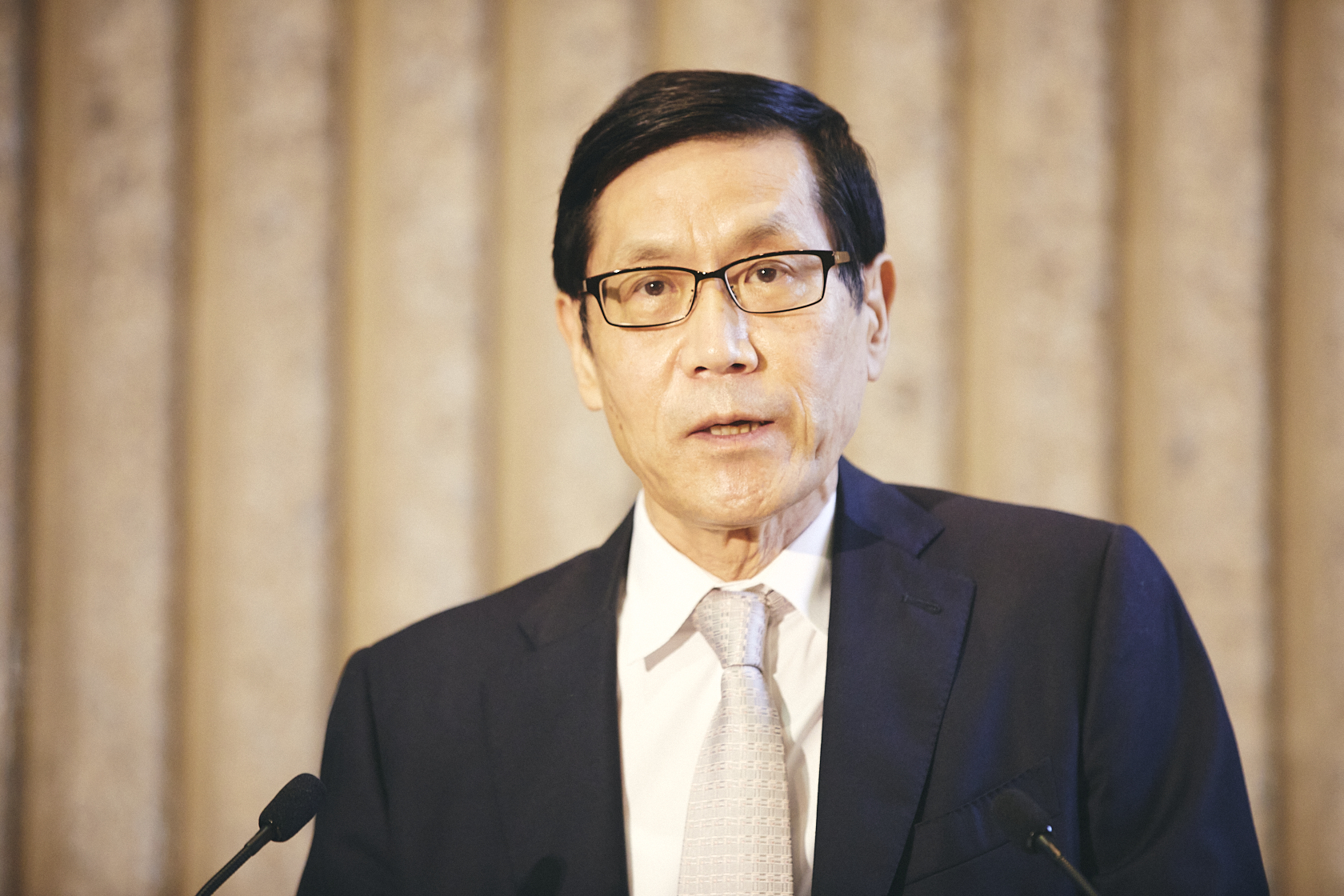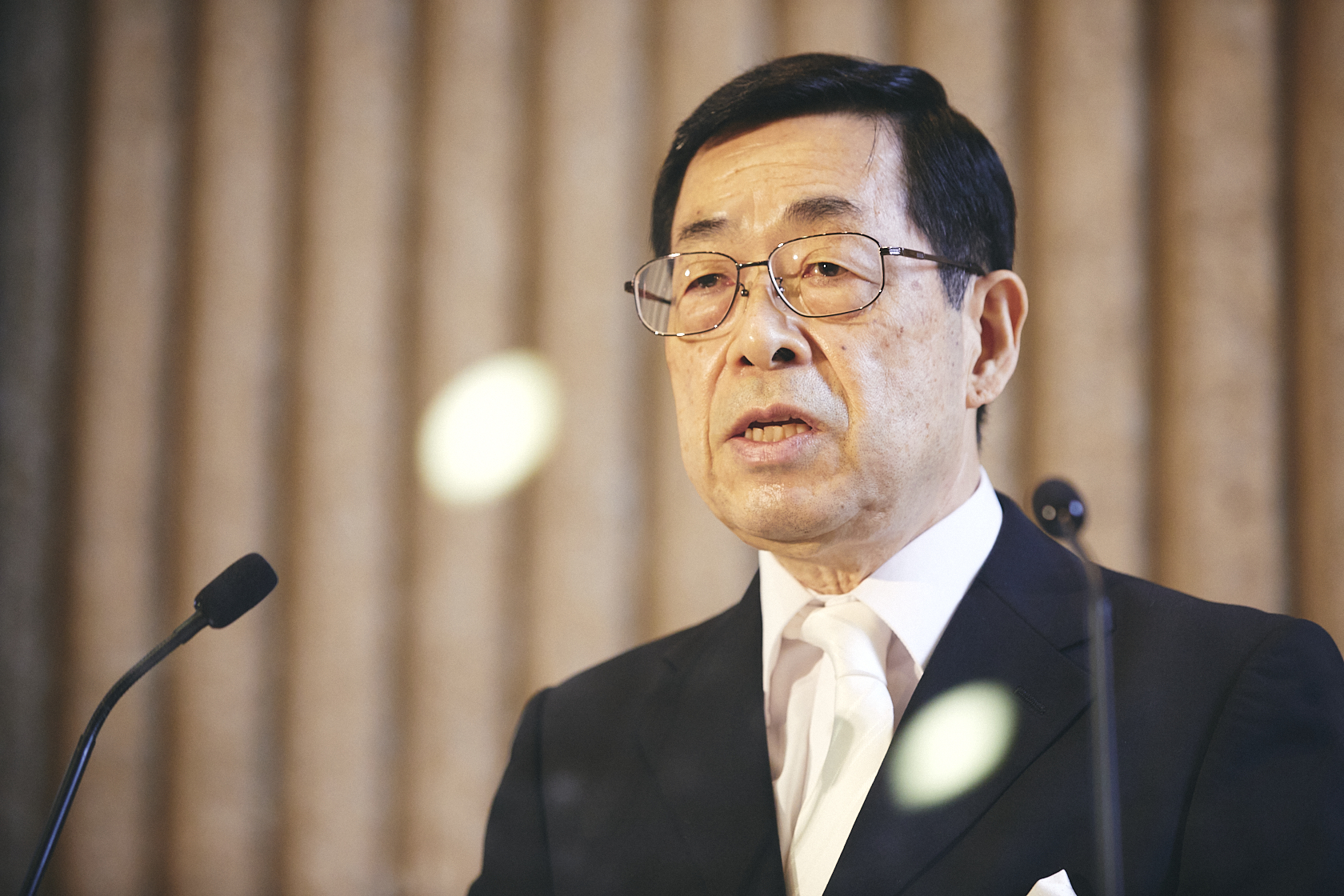Ceremonial/congratulatory addresses at the entrance ceremony for 2020 incoming students (held September 17, 2021)
I know you’ve been waiting a long time for this day.
To all 2020 incoming students, I would like to extend my sincere congratulations on entering Meiji Gakuin University, as well as my very best wishes to your families.
Normally I would have conveyed my congratulations to all of you in person in our chapel. In fact, today’s entrance ceremony is taking place a year and a half late, and in a format that might still be called less than perfect.
I have no doubt that over the past year and a half, in these uncertain times, our 2020 incoming students have felt great anxiety and experienced a university life that was quite different from what they had expected. For those of us at the university’s helm, there are many causes for regret—things we wish we could have done, and things we wish we’d done differently, in various situations and times. In particular, we are extremely sorry not to have been able to provide students with a true on-campus experience in the spring of the first year, which should have been the most enjoyable time of all for 2020 incoming students. I would also like to express our deep respect for the way in which you’ve all come through this very difficult situation to begin your university life, and for all your efforts and experiences up to now.
We must never forget this. At the same time, we on the faculty and staff will work together to recover elements that have been missing and activities that could not take place, in order to make your remaining two and a half years of university life as enjoyable as they were meant to be.
We at Meiji Gakuin University believe the essence of a fulfilling student life starts with the mutual influence of students, faculty and staff on our campus. When people and activities come together on campus, university really begins.
At our university, we’re working towards using classrooms at 50 percent capacity and greatly increasing in-person classes starting this autumn term. With these aims in mind, we have carried out a Workplace Vaccination Program over summer vacation in an effort to increase group immunity at Meiji Gakuin. We are also working to begin full attendance—in other words, restore the original university format—next spring. Whether this effort goes as planned, however, will depend on the COVID-19 situation. If there are difficulties, we will need to make use of online resources in order to continue our educational programs.
I will be grateful for your understanding of the university’s aims, and hope you will make an active effort to come to campus and have more opportunities to engage with people and activities here. Having more occasions for heart-to-heart interaction with others will give you a strong sense of the fullness of university life, and will surely help you make up for lost time.
We have long regretted that we were unable to hold your entrance ceremony in the usual format in April of 2020. Since that time we have been thinking about the ceremony and discussing when it could take place. We did have concerns about an entrance ceremony held in September of the year after your joining the university. If it takes place after so much time has passed, we wondered, will 2020 incoming students really come to campus to attend? Today I’m truly happy to see how many of you are here, with others participating online.
If you have the desire to come to campus and to make your student life as fulfilling as possible in the coming months and years, the remainder of your time at university will surely be enjoyable. We at the university will make every possible effort to support your journey, so that at your graduation ceremony two and a half years from now you will be able to say, “I’m glad I studied at Meiji Gakuin University.”
Lastly, I’d like to ask all of you to take good care of your health.
Congratulations on joining Meiji Gakuin University.
I would like to extend my congratulations to all of you on entering Meiji Gakuin University.
Do you know the phrase “negative capability”? “Negative” has meanings such as “contradictory” or “minus,” while “capability” often refers to “ability” or “talent.” Therefore, the literal meaning of “negative capability” is “contradictory ability” or “minus talent.” Of course, these phrases are incomprehensible. Loosely paraphrased, however, “negative capability” is said to mean “the ability to endure a contradictory situation” or “the ability to tolerate a state in which answers are not forthcoming.”
The first person to use the phrase “negative capability” was an English poet of the late 18th century. The phrase was subsequently taken up by a 20th-century British psychiatrist. Negative capability is the capacity to live with uncertainty, without searching frantically for facts and reasons. Actually, our society and our lives abound in situations we can’t control or manage or understand. We may not know, for example, why we possess a certain ability to a lesser degree than other people. We might have trouble recovering from an illness or injury, or find it more difficult than expected to advance academically or secure a job. There’s a familiar place where we can find people who have the capacity to endure situations for which they have no answers—the world of the Bible. There are many people in the Bible who go through life lamenting, “Why does God give me these trials? Why do so many hardships befall me? I wish God would help me.”
In our current circumstances and yours, a “situation without apparent answers” as described in the concept of negative capability has befallen us. You may be thinking, “Why did I become a university student at a time like this?” or “I’m going to lose a valuable period in my university life.” But those who acquire the capacity to endure these tough times will be able to weather any number of hardships in the future. There are many things that we’ve lost in the COVID-19 pandemic. But we still have many of the things that have been given to us—life and health, family and friends, education and knowledge, and the ability to think deeply about our way of life and what is important to us. I hope you will all lead a university life focused not on what we’ve lost, but on what we’ve gained and been given.
To conclude, in the Bible we find the following words in Chapter 5, verses 3 and 4, of the Letter to the Romans. “Suffering produces endurance, endurance produces character, and character produces hope.” It is my hope that we all acquire “negative capability”—the ability to endure situations for which we have no answers—and that we value one another and weather these difficult times together.
Congratulations once again.


